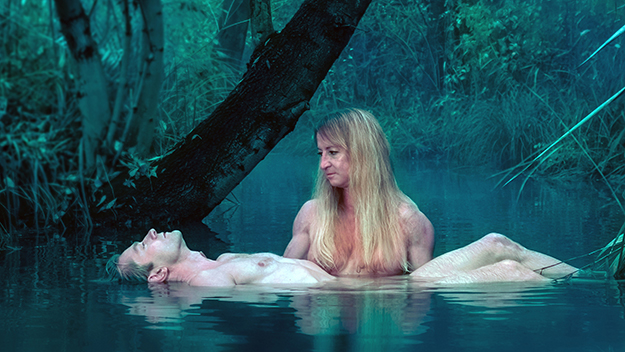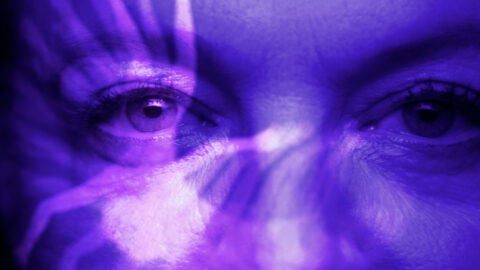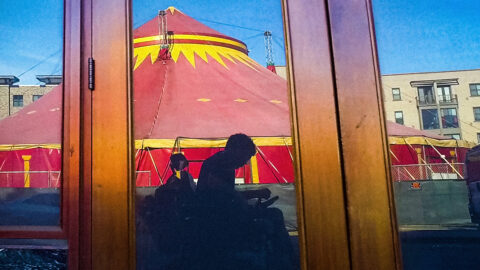Sundance 2022 Dispatch #4: Fiction
This article appeared in the February 3, 2022 edition of The Film Comment Letter, our free weekly newsletter featuring original film criticism and writing. Sign up for the Letter here.

Gentle (László Csuja and Anna Nemes, 2022)
Trying to find a unifying theme at a film festival is often a fool’s errand, not to mention a disservice to both filmmakers and programmers, but the guiding principle of most English-language fiction features at this year’s Sundance was clear: a desire to replicate the success of Get Out. More psychological thrillers than horror, these films, which were notably in the main dramatic competition instead of the genre-oriented Midnight section, centered their social critiques on race and gender with varying degrees of success. With the exception of a few titles—such as Nikyatu Jusu’s Nanny, which drew its gorgeous and troubling imagery from animist traditions—most were shot like HBO series, which is presumably the big brass ring for many of these directors. (None of these films looked as good as The Righteous Gemstones, however, which I watched on a short break from the festival.)
Mimi Cave’s Fresh was less a case of inspiration from Peele than outright theft. Noa (Daisy Edgar-Jones), a white woman bereft of personality, has to be saved from her very bad romantic getaway at a country house by her best friend Millie (Jonica “Jojo” T. Gibbs), a Black lesbian who fires off the most cringe-inducing “sassy” one-liners imaginable. (“Girl, you’ve been dickmatized!” stands out as one particularly egregious example.) For a film that’s supposedly about women, Sebastian Stan steals the picture as Noa’s love interest Steve, a handsome sociopath who, it turns out, serves a Squid Game–like clientele of perverts. Chloe Okuno’s Watcher, one of several feature films that dealt with the theme of misogynistic gaslighting, was similarly uninspired, and concluded with its vacant, carved-up, and conventionally attractive protagonist (Maika Monroe) lobbing an “I told you so” at her husband and the camera.
By contrast, Andrew Semans’s Resurrection found truth and universality by using that one weird trick of creating a fully realized character. Margaret (the always wonderful Rebecca Hall), a single mother who works at a biotech company, has her life upturned when her childhood abuser, Dr. David Moore (the frequently wonderful Tim Roth), returns to torture her. By detailing the incredibly complex and strange mental games David played with Margaret when she was a teenager—and which form the basis of the games he plays in the present—Semans illustrates how the illogical logic of abuse perpetuates a searing loneliness. Margaret’s intense resolve alternates between strength and weakness until the final reveal, which might beggar belief for some viewers but is realistically perverse for an abuser like David. The narrative risks films like Resurrection and Nanny took were particularly welcome compared to the self-parodic liberal do-gooderism of Phyllis Nagy’s Call Jane or the tired coming-of-age and/or failure-to-launch narratives of Stephanie Allynne and Tig Notaro’s Am I OK? and Lena Dunham’s Sharp Stick. (To clarify, I believe in a woman’s right to choose and have personally struggled with launching in the past, but both subjects need fresher treatments.)
Something closer to true formal and narrative experimentation could be found in many of the “world cinema” films, both in and out of competition. Goran Stolevski’s You Won’t Be Alone is perhaps best described as wondrously savage. After an encounter with a witch (a crone who always appears to be freshly burnt), a mother attempts to protect her daughter from becoming the witch’s companion by raising her in isolation within a sacred cave. But she fails, and the film follows her nameless daughter after she’s been forcibly turned into a witch. The girl attempts to participate in human society by inhabiting different bodies through a gruesome process that involves ripping out someone’s flesh and sticking it inside her chest where her heart once was. She struggles to fully assimilate, and her interior monologue is idiosyncratic and highly impressionistic—sometimes unintelligible yet poetic. Still, there’s a whisper of social commentary in her narration. When musing on how she, when inside of an adult woman, must behave around other women, she thinks: “Your mouth—it should never stop opening. . . . You are a looking glass.”
The unwieldy titular protagonist of Martika Ramirez Escobar’s Leonor Will Never Die is no less of a tragic figure, but exists within a far funnier, more complicated world. Leonor Reyes (musician Sheila Francisco) is a formerly successful Pinoy action-film director who abandoned her career following the on-set death of one of her sons. Now unemployed, she can barely pay her electricity bills and fritters away the hours by renting action movies from a kid at a local market. After seeing a flyer for a screenplay competition, she digs out an unfinished script and resumes writing. While she is puttering around outside, a television set falls on her head, and she wakes up inside the film she is scripting. Ramirez Escobar blends an array of metatexual devices, cinematic styles, and magical-realist occurrences in compelling and hilarious ways, such as when Leonor’s living son Rudie smashes his head into a hospital television in order to join his mother inside her film and protect her during its big climactic shootout. The director also appears in seemingly unscripted discussions about how to end the film, which is the very problem Leonor has been wrangling with in the diegetic world. What Ramirez Escobar settles on—a behind-the-scenes karaoke music video—extends the film’s stylistic and narrative ethos up until the very last, joyous frame. (Although it could also be read as a way to “safely” end the movie and avoid expanding upon the film’s brief allusions to Rodrigo Duterte’s bloody, corrupt war on drugs, which has no end.)
Magical-realist flourishes and some well-placed (but far stranger) songs also feature in Francisca Alegría’s The Cow Who Sang a Song Into the Future, which unravels colonialism’s environmental repercussions through a story about a family of white dairy farmers. While it sometimes veers dangerously toward the quirky, the film’s exploration of the trauma exacted upon kin and land alike is frequently insightful. Utama, which won the world dramatic jury prize, takes on the same subject from the perspective of elderly indigenous Bolivians living on the Altiplano, the high and extremely dry plateau in the Andes that has become barely habitable in recent years. The exquisite compositions of director Alejandro Loayza Grisi (formerly a cinematographer) mourn the ravages of climate change without ever getting preachy. In addition to showing the often disrespected traditions, daily routines, and beliefs of these holdouts, the film ingeniously flips a linguistic divide common across Latin America. Clever (Santos Choque), the grandson of Virginio (José Calcina) and Sisa (Luisa Quispe), comes to beg them to leave for the city (just as his father did), but cannot speak Quechua, and is shut out of important conversations within his family and community. The catastrophic loss of connection and tradition across two generations is matched by the catastrophic loss of rain in the Altiplano, which, the film reminds us, cannot be restored through the characters’ actions alone.
My favorite film of the festival also dealt with change, albeit physical and mental, rather than climatic. Gentle, co-written and co-directed by former couple László Csuja and Anna Eszter Nemes, explores the harsh truths of long-term relationships through a story set in the bodybuilding world. Edina (Eszter Csonka, an actual bodybuilder) has been training for 10 years with her boyfriend Ádám (György Turós), a former world-champion bodybuilder. For Edina to have a shot at first prize at the upcoming world tournament, the two of them must scrounge up thousands of euros for supplements and (legal) performance-enhancing drugs. Following Ádám’s half-hearted, failed attempt at stripping, Edina decides to try sex work and begins servicing a variety of muscle fetishists. Though the lovers are united in their endeavor to win, their relationship suffers from an unspoken problem (or perhaps an array of problems) that only worsens when Edina meets a john whose fantasies are tender, reverential, and sometimes childlike.
The brutal realities of female bodybuilding—and the fundamental contradictions these athletes grapple with by rejecting conventional beauty standards yet risking their health to fit themselves into an altogether different ideal—complicates Edina’s dedication to her craft. The film’s beautiful, dreamlike sequences, including an oneiric seduction in a locker room and a Pietá in a botanical garden, enrich its thoughtful meditation on bodies, body image, and sexual attraction. In a program full of films overburdened by the weight of their purpose, Gentle was a welcome reprieve.
Violet Lucca is the Web Editor and Digital Director of Harper’s Magazine, and the host of its podcast. Her work has appeared in the New York Times, Sight and Sound, Art in America, and many, many times in Film Comment.







